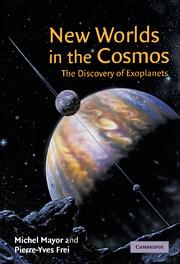Book contents
- Frontmatter
- Contents
- List of figures
- Preface
- Acknowledgements
- 1 The quest begins
- 2 Infinity and beyond
- 3 New arrivals in the Solar System
- 4 Why stars wobble
- 5 Neutron planets
- 6 Brown dwarfs in the headlines
- 7 Sirens in the Cosmos
- 8 Foreign planets different to our home-grown ones
- 9 Destination: earths!
- 10 Further yet: life
- Appendix. Properties of the exoplanets
- Glossary
- Bibliography
- Plate section
1 - The quest begins
Published online by Cambridge University Press: 06 July 2010
- Frontmatter
- Contents
- List of figures
- Preface
- Acknowledgements
- 1 The quest begins
- 2 Infinity and beyond
- 3 New arrivals in the Solar System
- 4 Why stars wobble
- 5 Neutron planets
- 6 Brown dwarfs in the headlines
- 7 Sirens in the Cosmos
- 8 Foreign planets different to our home-grown ones
- 9 Destination: earths!
- 10 Further yet: life
- Appendix. Properties of the exoplanets
- Glossary
- Bibliography
- Plate section
Summary
The discovery of the exoplanets is undoubtedly a technological feat. But without exceptional people, there would not be any technological feats. So it's equally – and maybe even primarily – a human adventure, a personal experience, and, for this reason, is better narrated in the first person singular, in the voice of Michel Mayor. This will essentially be the case in the first chapter, but also every now and then in later chapters (especially Chapters 6, 7 and 8). These uses of ‘I’ are like memories which suddenly bubble up to the surface during particular scenes. And during the numerous interviews that took place between the scientist and the journalist, there were many of these bubblings. So, henceforth, ‘I’ and Michel Mayor will be indistinguishable.
Having made this comment, all that remains to be done is to set the scene by beginning with a trip through time and space. It's October 1995, in Florence, the seductive Tuscan town where art and science live hand in hand in idyllic happiness. It's there that it all starts, where the discovery would see the light of day.
For Didier Queloz, my young collaborator, it's his first trip ever to Italy. Given the (happy) circumstances which brought us here, he decided to celebrate the event, sharing a room in a beautiful hotel, combining luxury and quaint charm, with his wife, Valérie.
- Type
- Chapter
- Information
- New Worlds in the CosmosThe Discovery of Exoplanets, pp. 1 - 22Publisher: Cambridge University PressPrint publication year: 2003



